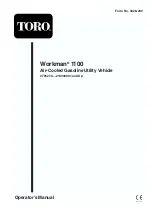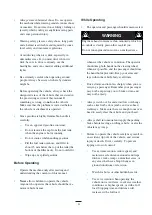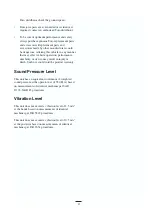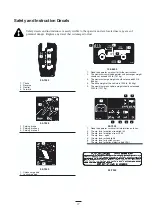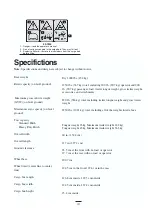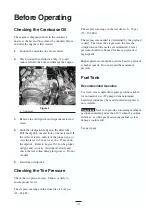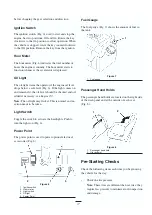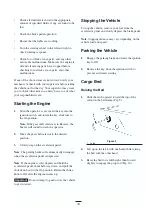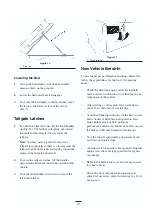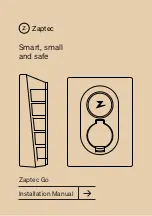
Operating on Hills
These extra cautions need to be taken when operating
the vehicle on a hill:
•
Slow down before starting up or down a hill.
•
If the engine stalls or you begin to lose headway
while climbing a hill, gradually apply the brakes
and slowly back straight down the hill.
•
Turning while traveling up or down hills can be
dangerous. If you have to turn while on a hill, do
it slowly and cautiously. Never make sharp or
fast turns.
•
Heavy loads affect stability. Reduce the weight of
the load and your speed when operating on hills
or if the load has a high center of gravity. Secure
the load to prevent it from shifting.
•
Avoid stopping on hills, especially with a load.
•
Stopping while going down a hill will take longer
than stopping on level ground. If the vehicle must
be stopped, avoid sudden speed changes, which
may initiate tipping or rolling of the vehicle. Do
not slam on the brakes when rolling backward, as
this may cause the vehicle to overturn.
•
Travel straight up and down slopes whenever
possible.
•
We strongly recommend installing the optional
roll-over protection system kit when operating on
hilly terrain.
Operating on Rough Terrain
Reduce speed and load when operating on rough
terrain, uneven ground, and near curbs, holes, and
other sudden changes in terrain. Loads may shift,
causing the vehicle to become unstable.
We strongly recommend installing the optional roll-
over protection system kit when operating on rough
terrain.
Loading and Dumping
The weight and position of the cargo and passenger
can change the vehicle center of gravity and vehicle
handling. To avoid loss of control and personal injury,
follow these guidelines:
•
Do not carry loads which exceed the load limits
described on the vehicle weight label; refer to
Specifications
for vehicle weight limits. The load
rating is for level surfaces only.
•
Reduce the weight of the load when operating on
hills and rough terrain to avoid tipping or
overturning of the vehicle.
•
Reduce the weight of the load if the center of
7
Operating the vehicle on a hill may cause tipping or
rolling of the vehicle, or the engine may stall and
you could lose headway on the hill. This could result
in personal injury.
•
Do not exceed slopes greater than 12°.
•
Do not accelerate quickly or slam on the brakes
when backing down a hill, especially with a
load.
•
If the engine stalls or you lose headway on a
hill, slowly back straight down the hill. Never
attempt to turn the vehicle around.
•
Never drive across a steep hill; always drive
straight up or down or go around the hill.
•
Avoid turning on a hill.
•
Reduce your load and the speed of the vehicle.
•
Avoid stopping on hills, especially with a load.
WARNING
Sudden changes in terrain may cause abrupt steering
wheel movement, possibly resulting in hand and arm
injuries.
•
Reduce your speed when operating on rough
terrain and near curbs.
•
Grip the steering wheel loosely around the
perimeter. Keep your hands clear of the steering
wheel spokes.
WARNING
Summary of Contents for Workman 1100
Page 36: ......

